February and Forever: Celebrating Black History Today and Every Day
While Black History Month occurs each February, it is important to acknowledge and support Black Canadian service members and Veterans every day of the year.
Black Canadians have committed themselves to serving our country militarily, at home and abroad, since the 19th century. From the Victoria Pioneer Rifle Corp in the 1850s to Black service personnel fighting bravely in Afghanistan, and caring for the elderly during a pandemic, there is a long history of heroism and selflessness to share, to reflect upon, and to celebrate.
Throughout the month of February, we will present profiles of Black Canadian Veterans who were active in many conflicts, some more recent and some from many years ago. We will share stories of valour and strength, compassion and care. These are the stories of our brothers and sisters in arms who fought along side their comrades with a common purpose and goal – to ensure the success of their mission, to protect the innocent, and to represent Canada with honour.
We encourage you to follow our Black History Month posts on our social channels – Facebook, Twitter, and LinkedIn – and to return to this page throughout the month for new profiles of brave Black Canadian Veterans.
For additional resources celebrating the achievements of Black Canadians in the military, please visit:
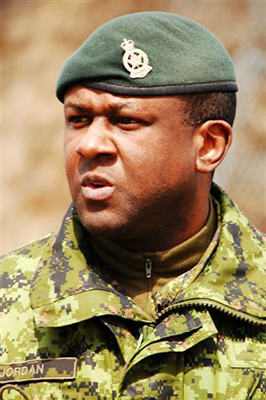
Having served in the CAF from 1987 to 2012, Warrant Officer (Ret’d) Cyril Jordan’s 23 year-long career is an inspiration to many. Jordan started his career in the Royal Montreal Regiment (RMR) in 1987. In his tenure at the RMR, Jordan found community and family. He speaks highly of the RMR for being a diverse unit that embraced individual and team strength.
In 1990, Jordan embarked on his first tour in Cyprus. Being the only Black person in his company, Jordan quickly learned the challenges he would have to overcome to succeed within the ranks.
“If there is no struggle, there is no progress.”
– Frederick Douglass
Without struggle, there is no perseverance. Jordan often had to remind himself of that: That things won’t always come easy, but they are worth pushing through. And it’s a good thing Jordan did push through. Things started to change throughout this tour. As team members moved to new positions and postings, things improved.
After his first tour ended later in 1991, Jordan’s career progressed as he took on his second tour in Yugoslavia. Throughout these tours and his career, Jordan met lifelong friends and began climbing the ranks progressing to meet his retiring position of Warrant Officer.
The road was not always easy. Although Jordan felt welcomed and accepted in his home unit with the RMR, he still faced discrimination and setbacks throughout his tours. But as he tells his kids, “The worst thing you can do is let someone knock you down. When you get knocked down, you have to get back up.” And that is what he did.
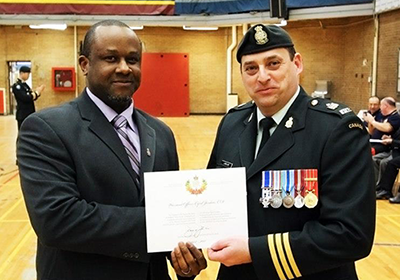
Jordan’s extensive career is represented by the United Nations Peacekeeping Force in Cyprus (UNFICYP) Medal, and the UN Protection Force in the former Yugoslavia (UNPROFOR) Medal. Also, he is the recipient of the Canadian Peacekeeping Service Medal (CPSM), the Queen’s Diamond Jubilee Medal (QDJM) and the Canadian Forces Decoration (CD) with clasp.
“I’m proud of both the tours that I did. I’m proud that I still persevered through all the issues that I had to deal with in regards to being a visible minority. I’m proud that I didn’t let anything stop me from moving forward. And if I had one piece of advice to give, it would be, take the step forward and see what happens. You never know where you’ll end up.” – Warrant Officer (Ret’d), Cyril Jordan.
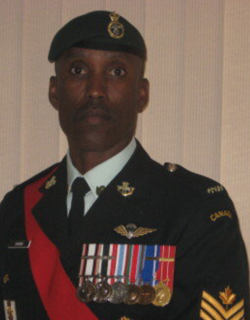
Sgt (Ret’d) Arnold Parris can express his experience joining the Canadian Armed Forces (CAF) in a few words, “It was the best decision I ever made!”
As a young man, Parris was always interested in joining the military. His inspiration to join the Army never wavered despite being warned off by some stating that it was not a good environment for a young Black man. However, after being urged on by a Veteran from the Vietnam War, Parris joined the Army reserves in 1978 and subsequently full-time service in 1983.
Parris’ experience as a Black member of the CAF was the opposite of what some people had told him. Within the ranks, he found community, comradeship, a sense of purpose and, most importantly, family. He wasn’t oblivious to the fact that racism was present, but he wasn’t going to allow the actions of a few tarnish his new found life as a Canadian soldier.
After basic and trades training as an infantryman, Parris joined the Second Battalion Princess Patricia’s Canadian Light Infantry (2PPCLI). He was immediately impacted by how soldiers performed together under duress, especially in the field. His first overseas duty was in CFB Baden-Sollingen, in what was then known as West Germany.
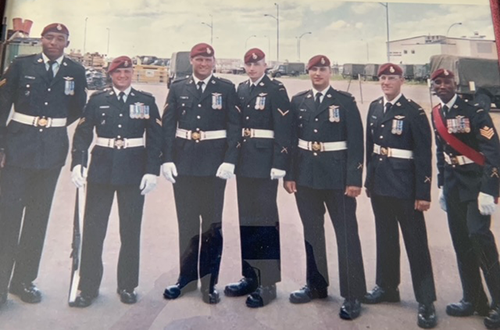
Parris excelled in the physical aspect of soldiering, and when given the opportunity to serve in the Canadian Airborne Regiment, he took it. He served two tours, 1988 until 1992 and then again in 1994. Being a paratrooper was the highlight of his career – Germany was good, but this was better.
Amongst his medals for the various overseas tours, The Special Service Medal with NATO Bar, the United Nations Protection Force in the former Yugoslavia (UNPROFOR), NATO Medal (BOSNIA) and the Afghanistan Campaign Star. He is the recipient of the Canadian Peacekeeping Service Medal (CPSM), the Canadian Forces Decoration (CD) with two clasps, the Canadian Forces Sacrifice Medal. He has received two Commander-in Chief Unit Commendations, 2 PPCLI Battle Group for their actions in Croatia and 3 PPCLI Battle Group for actions in Afghanistan.
Parris reflects fondly on his time in the CAF. One of his postings was as a recruiter, and his role was to create awareness of the different employment opportunities within the CAF in visible minority communities, specifically young Black men and women. He would say that “It’s the best kept secret,” and echoing the sentiment of the Veteran who urged him on, “Join now! And when you do, regardless of what happens – don’t quit!” Great advice from such a distinguished soldier.
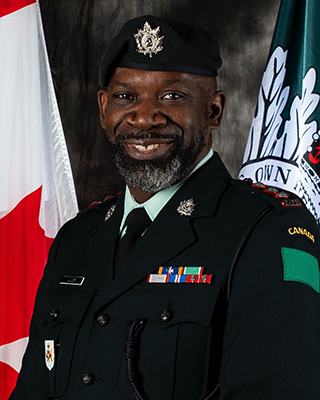
Captain Kevin Junor’s 34-year plus career with the Canadian Armed Forces (CAF) has made an impact to last decades. In 1980, Kevin enrolled as a private soldier with the Toronto Scottish Regiment. He climbed through the ranks to become a Chief Warrant Officer (CWO) in 1998 and was appointed the Regimental Sergeant Major (RSM). This was a significant appointment, as the RSM is considered the most tenured and experienced soldier within a unit that represents all of the NCMs and is the primary advisor to the Commanding Officer.
On his operational tour to Sierra Leone, Kevin served as a Senior Military Advisor. He was assigned to help restore and advise the Republic of Sierra Leone Armed Forces (SLAF) after its decade-long civil war. As a Black man on this tour, Kevin felt he could make an impact by going above and beyond his regular duties. So he did.
Kevin noticed a gap in the professional development training for the SLAF RSM cadre. With that need for improvement in mind, Kevin developed a training program. His program concentrated on leadership, change management, and team building. He conducted the course in 2007 and it was conducted as late as 2011. This program created the rubric for the future. Kevin looks back on this experience as something he is most proud of. Giving others the opportunity to be given the appropriate respect for their position for the first time in their military career, that’s what it was all about.
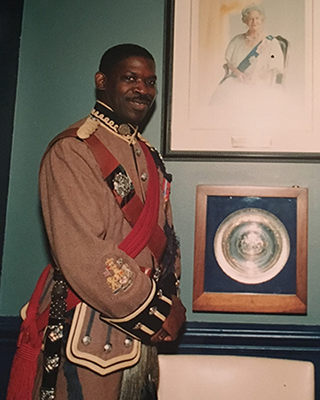 After being the RSM, Kevin became a diversity advisor within the CAF, in which he was the National Military Co-Chair of the Defence Visible Minority Advisory Group. In 2020 Kevin began his operational tour in Jordan as a Project Officer.
After being the RSM, Kevin became a diversity advisor within the CAF, in which he was the National Military Co-Chair of the Defence Visible Minority Advisory Group. In 2020 Kevin began his operational tour in Jordan as a Project Officer.
During this tour, he was responsible for coordinating a gender integration seminar. Always the innovator, Kevin took this opportunity to do something different. He proposed a new model to restructure the seminar by concentrating on the experience of the Jordanian Armed Forces (JAF). This approach was new and was a big shift from what was done in the past. For the first time, the seminar was run entirely in Arabic and led by the JAF, with the CAF as support. Similar to his experience in Sierra Leone, this format became the new model going forward.
 Kevin has earned countless awards and honours throughout his career, including the Order of Military Merit and the Harry Jerome Professional Excellence Award. He even has a miniature toy soldier modelled after him and was also one of the few Canadians invited to the Queen Mother’s 90th birthday, 100th birthday, and funeral.
Kevin has earned countless awards and honours throughout his career, including the Order of Military Merit and the Harry Jerome Professional Excellence Award. He even has a miniature toy soldier modelled after him and was also one of the few Canadians invited to the Queen Mother’s 90th birthday, 100th birthday, and funeral.
Kevin enjoyed his time with the CAF so much that he took his commission to Captain and continues to serve to this day. He speaks of the CAF as a great place that will challenge you, stretch you, and a place where you will learn more than you ever thought you could. If he had one piece of advice to give, he would say, “Don’t let anybody define who you are. You have the ability to define yourself and don’t give that power to anybody.”
Fardous Hosseiny, President and CEO of the CoE – PTSD, said that while many Veterans successfully transition to civilian life, it cannot be ignored that Veterans are at a higher risk for mental health issues than is the rest of the Canadian population. “Mental health concerns impact Veterans in many areas, from quality of life, to relationships, to finances amongst others, yet it is common for Veterans to experience delays in accessing care,” Hosseiny said. “Right now, we have amendments in front of us that, for two years, will address access to coverage for mental health treatments, as well as relieving financial risk and burden, which have all impacted Veterans. We have window of opportunity for those with a stake in how Veteran benefits are administered to have their voices heard, and to have a chance to weigh in on what the final regulations will be.”
According to information released by VAC, if this regulatory change is approved, Veterans living in Canada who apply for a disability benefit for an eligible mental health condition – as well as those who have already applied – will automatically qualify for Mental Health Benefits. Accessing mental health treatment could reduce the likelihood of prolonging or worsening the Veteran’s mental health condition. Starting on 1 April 2022, Veterans would have up to two years of treatment for conditions such as anxiety disorders, depressive disorders, and trauma-and-stressor-related disorders, which includes PTSD.
Brian McKenna, Strategic Advisor for Veterans with the CoE – PTSD, has met the announcement with cautious enthusiasm, noting that this is the result of Veterans advocating for years. “Anything that shortens the timeline for access to much-needed benefits is a win. This minimizes the risks associated with waiting before a Veteran can access coverage for treatment. However, to positively impact the Veteran mental health journey it will be important for these changes to be implemented in a way that reflects what Veterans and Family members have identified as critical issues.”
McKenna acknowledged that for Veterans and Families who have had to pay out of pocket to access costly, much needed mental health care, this allows them to make choices about seeking treatment based on their health needs, rather than financial situation. He also highlighted that there are areas where clarification is needed, such as whether the amendments will allow additional therapies, if they include addiction treatment as part of the scope, and whether tele-health and digital health might be used to increase access.
“What I do know,” McKenna said, “is that we’ve advocated for a very long time to get to this place, and this isn’t the time to step back. It only makes sense to carry that on through implementation of the policy and roll out, so we can identify as soon as possible any improvements which can be made.”
The Regulations Amending the Veterans Health Care Regulations can be found in the Canada Gazette, Part I.
Input on the amendments should be directed to cabinetbusinessunit-unitedinformationducabinet@veterans.gc.ca until 30 January 2022 for consideration.
The Centre of Excellence on PTSD (CoE – PTSD) acknowledges the formal apology delivered by Minister of National Defence, Anita Anand, on December 13, 2021, as a positive step in the recognition of the harms suffered by individuals who have experienced sexual misconduct while serving in the Canadian Armed Forces (CAF).
Chief of the Defence Staff Gen. Wayne Eyre and Jody Thomas, Deputy Minister of National Defence also offered apologies, and within, acknowledged the impact of MSM on friends, Family members, and bystanders. This formal, public apology is a recognition and validation of the experience of thousands of CAF members (current and former, Federal Public Servants of the Department of National Defence (DND), and Staff of Non-Public Funds, some of whom may also be Veterans), and furthers DND and CAF’s public commitment to change. This apology follows other commitments towards change, including the Heyder Beattie Class Action, changes to CAF and Veterans Affairs Canada (VAC) policies, and other ongoing efforts, including a Restorative Engagement program, and funds for expansion of the Sexual Misconduct Response Centre (SMRC)’s mandate and services offered.
It is the position of the CoE – PTSD that for its apology to be meaningful, DND and the CAF must continue to work toward sustained culture change and gender equality. This would involve taking account for the wrongdoings, acknowledging the legacy of marginalization and exclusion of women and 2SLGBTQ+ members, and taking full responsibility for creating and enabling the gendered and sexualized culture that permits military sexual misconduct, and expressing regret for what happened—and for what continues to happen.
Within the CAF, women remain at greater risk for sexual misconduct, but the experiences of men and gender-diverse people are increasingly coming to the fore. Indeed, the experiences of 2SLGBTQ+ and people of colour may be exacerbated by discrimination on those grounds. Individuals who are part of multiple equity-seeking groups may experience the cumulative stress of intersectional discrimination that puts them at increased risk of developing PTSD and other mental and physical health problems.
Military sexual misconduct can include sexual harassment, hazing rituals, sexual assault and/or discrimination on the grounds of sex, gender, gender identity, or sexual orientation. Individuals who endure these behaviours are at increased risk of depression, problematic substance use, PTSD and other mental health and physical health problems including reproductive health issues, and chronic pain. It may result in feelings of shame and self-blame, moral injury, and feelings of institutional betrayal, which may in turn affect a person’s career and ability to serve their country. Indeed, the impacts of military sexual misconduct and military sexual trauma (MST: a term used to describe the psychological, physical and social impacts or “wounds” that people who experience or witness military sexual misconduct may feel) can be life-long and enduring.
We acknowledge that the DND and the CAF cannot do this work alone. This is why, starting in 2019, the CoE – PTSD joined a diverse group of people with lived experience, researchers, policy makers, clinicians, and government representatives who, together, form the Canadian Military Sexual Trauma Community of Practice (MST – CoP). The MST – CoP hosted an international three-part symposium to raise awareness about this critical issue and to advance the efforts of organizations and individuals supporting people impacted by MST, and produced a fact sheet on MST. The MST – COP can continue to bolster the ongoing efforts of the DND and the CAF through research undertaken by its members, information-sharing efforts, and commitment to expand public awareness.
The CoE – PTSD remains committed to working with people impacted by MST, the MST – CoP, and other network partners to support system-wide efforts that will enable much-needed lasting change.
We are interested in connecting with First Responders/ Public Safety Personnel, First Responder/ Public Safety Personnel Families, Service Providers and Researchers to learn about your knowledge and information needs as they pertain to PTSD and related mental health conditions.
This project is an extension of a Gap Analysis project that is currently underway related to Veterans and their Families that is also being conducted by VIRGO Planning and Evaluation Consultants Inc. We are preparing to share the findings from this analysis. The CoE has received funding from Medavie Foundation for this follow-up First Responder project. We are working closely on this work with the Canadian Institute for Public Safety Research and Treatment (CIPSRT), as part of our ongoing commitment to collaboration.
Purpose of Survey
The brief questionnaire is focused on learning about your knowledge/information needs. We will use your responses to inform the development of a suite of resources relevant to First Responders/ Public Safety Personnel (including Veteran RCMP) and their Families to increase awareness of Post Traumatic Stress (PTS), reduce stigma, support well- being and help-seeking and link to available, relevant resources. Responses will also be used to inform key partners and stakeholders across the PTS system who are working with/interested in First Responders/ Public Safety Personnel populations.
As a key stakeholder, you will be asked to share your knowledge/information needs about:
- PTSD and related mental health conditions (including substance use conditions),
- Your preferred ways of having those needs met,
- The ways in which you use, or would like to use knowledge/information
We understand that you may bring many perspectives (e.g., first responders / public safety personnel, first responders / public safety personnel Family member, service provider, person with lived/living experience of PTSD/related mental health conditions, etc.). We encourage you to speak from any of these perspectives when answering the questions that follow. If any of the questions are not applicable to you, please leave it blank.
Thank you for your contribution, and for helping us in our work to improve services and supports.
On the 11th hour of the 11th day of the 11th month in 1918, the guns went silent and the battles of the First World War were over. Since that day, Canadians have gathered annually to honour and remember those who served and those who made the ultimate sacrifice in service to the nation.
Canada has had a history of brave service to the world. From the Great War to Afghanistan, close to two million men and women have left their homes and families, and have travelled to distant lands. They have put themselves into situations of extreme danger and trauma. Many were wounded, both physically and emotionally. Well over 100,000 Canadians – sons, daughters, brothers, sisters, partners, and friends – were killed in action or died of their wounds.
We will remember them.
Each year, the Remembrance Day service at the National War Memorial in Ottawa ends with the Parade of Veterans. Canadians who attend the service honour them, applauding as the Veterans march by. Many calls of “thank you!” can be heard from the crowd.
“Let us always thank them for what they gave to this country. Let us never forget the ones who didn’t come home. And, let us be supportive and caring to those Veterans now living with PTSD. Join us in creating a compassionate nation that truly sees and cares for those who served.”
Laryssa Lamrock, Strategic Advisor for Veteran Families and Brian McKenna, Strategic Advisor for Veterans, at the Centre of Excellence on PTSD.
The Centre of Excellence on PTSD honours Canadian military and RCMP personnel, Veterans, and their Families on this day, and every day.
Every year, Veterans’ Week provides moments of reflection, and often of grief, for still-serving members of CAF, Veterans, and their Families.
Trauma experienced while on duty can create invisible ribbons of pain that extend across generations and relationships. As a culture, we are coming to understand the impacts of military service on individuals, as well as on their Families and friends. What was once called “shell shock” or “battle fatigue” is now more properly understood as Post-Traumatic Stress.
Increasingly, services and supports are being tailored to respond effectively to the specific needs of those who have served this nation. But, there is still much work to do, and significant improvements in Veteran-centred care are needed.
The Centre of Excellence on PTSD asks all Canadians to reflect upon the immense contributions that Veterans, active CAF members, and their Families have made, and continue to make, to this country, both at home and abroad.
We urge everyone to pause on Remembrance Day, and honour those who have given so much throughout the generations. After that day, we will continue to remember and support those still serving and those who are now Veterans. They deserve nothing less.
For Veterans’ Week 2021:
- Commemorating Veterans’ Week 2021, View the Centre of Excellence’s new PSA.
- Holidays Ahead
For many Veterans and their Families, the holidays are not an easy time of year. In fact, they are often one of the toughest. The holidays can also bring up unpleasant reminders of previous traumatic experiences.To-do lists, busy gatherings, and crowds can feel overwhelming, To help Veterans and their Families through this difficult time, here’s a resource that provides tips and strategies for coping during the holiday season. - Veterans Affairs Canada Podcast Series
We all benefit from the service and sacrifice of the 2.3 million+ Canadians who have served our country for over 100 years. It is our duty to honour and remember them.Listening to VAC’s Faces of Freedom podcast is a powerful way to remember and reflect.The podcast features stories from Canadians who have proudly served at home and abroad, from natural disaster relief operations to Canada’s mission in Afghanistan. Listen here: https://www.veterans.gc.ca/eng/remembrance/people-and-stories/podcasts/veterans-week-2021
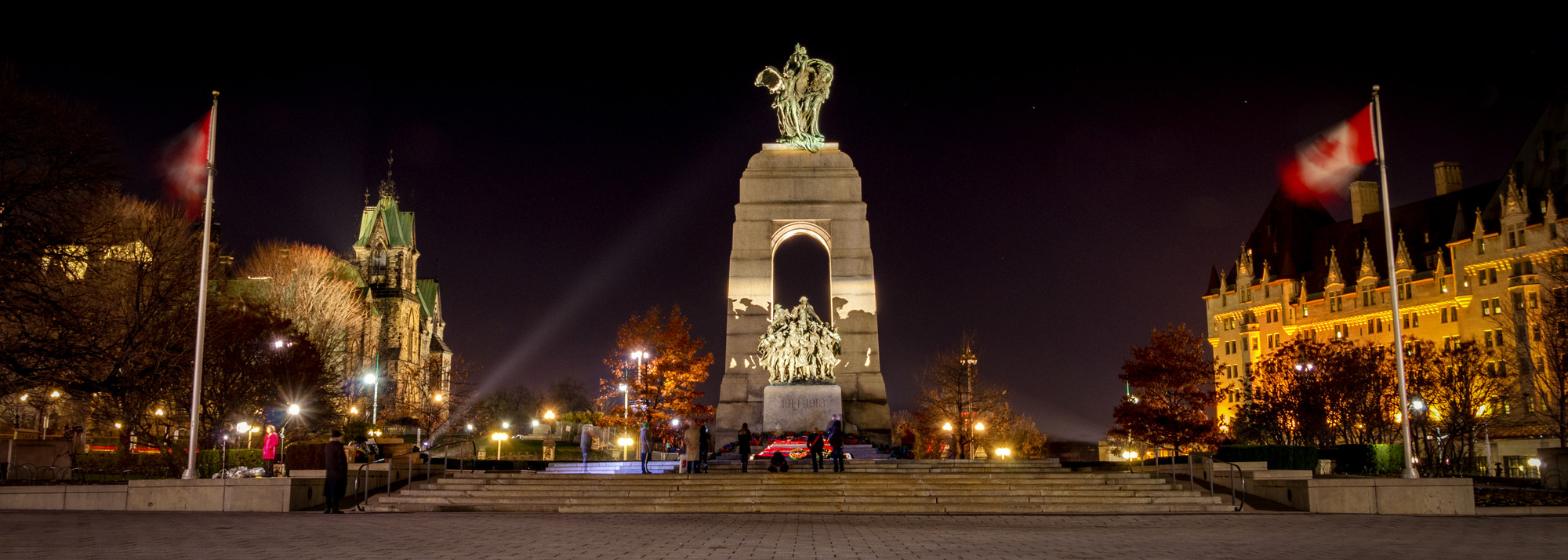
Remembrance Day is the start of a season that can be challenging for some Veterans and their Families. Resources and supports are available. Explore the links below to learn more about PTSD, some options for treatment, as well as tips and strategies for coping with the holidays.
If you, members of your family, or your friends need support:
Find Support – Centre of Excellence on PTSD
If you want to learn more about the causes and symptoms of PTSD, as well as treatments options:
PTSD and Some Options for Therapy – Centre of Excellence on PTSD
If you are a Family member or friend of a Veteran and want to know about supports and services that are available for you:
For Veteran Families and Friends – Centre of Excellence on PTSD
To learn more about national commemorations for Veterans’ Week:
Commemorative Events – Veterans Affairs Canada
The Centre of Excellence on Post Traumatic Stress Disorder (CoE – PTSD) welcomes the reappointment of the Honourable Lawrence MacAulay to the role of Minister of Veterans Affairs and Associate Minister of National Defence, a position he has held in the federal cabinet since 2019.
“We would like to congratulate Minister MacAulay on his re-appointment,” Dr. Patrick Smith, President and CEO of the CoE – PTSD said. “This speaks to the importance of constancy in this portfolio moving forward in a newly mandated government.”
Smith added that the CoE – PTSD, for the most part, has been built during the pandemic, and as it continues to grow into its mandate there is a need to ensure stability through an integrated approach to Veteran and Family well-being into the future.
“We look forward to continuing to build on the supportive relationship we have established with the Department, and to move ahead with our work in support of Canadian Veterans and their Families. We are committed to ensuring that all Canadian Armed Forces and RCMP Veterans and Families have access to safe, meaningful resources and supports that protect their dignity and identity, create foundations for hope, connection, and community, and improve health and well-being while ensuring a sense of purpose.”
Additionally, the CoE – PTSD would like to congratulate the Honourable Anita Anand on her appointment as Minister of National Defence. MaryAnn Notarianni, Vice President of Knowledge Mobilization, who oversees the work on the Military Sexual Trauma file, added that given the importance to the Veteran community of this issue, it will be critical for the new Minister to ensure the voices of those impacted continue to be heard and meaningfully engaged on the path forward. Notarianni added. “We remain committed to working with our network of partners to support system-wide efforts that will disrupt the status quo and enable much-needed culture change.”
Fardous Hosseiny, Deputy CEO at the CoE-PTSD, said that it is important to recognize the Government of Canada for establishing a new ministry responsible for Mental Health and Addictions for the first time in history. Expanding the cabinet to include these issues is an indication the government is recognizing the need in the sector.
“We know people with lived experience and expertise, advocates, and those representing organizations working in the sector – as we are – have long called for a significant focal shift on mental health and addiction. We are pleased to see the importance of this recognized in having a federal Minister dedicated to the file; particularly within the context of what we have learned over the past 20 months as we’ve navigated the impact on this issue of a global pandemic,”
Fardous Hosseiny
For further information, contact:
Joy Pavelich, Vice-President of Strategy & Operations
joy.pavelich@theroyal.ca
Honouring the family members and friends who stand beside those in uniform
Founded by Together We Stand, Military Family Appreciation Day was established in 2019 as a nationally recognized day to honour Canadian Military Families. Now celebrated each year on the third Friday of September, it is a time to acknowledge and honour those who stand beside those in uniform.

While the Canadian Armed Forces may not currently be active in a large-scale overseas operation at this moment, there are still approximately 2,000 CAF personnel deployed across 20 countries. In addition, as recently as this summer, other CAF personnel took time away from their homes to assist Canadian communities in the fight against Covid-19, forest fires in Ontario, BC, and Manitoba, as well as flooding in Manitoba.
Every one of those members in uniform is someone’s spouse, partner, parent, child, sibling, or friend. While the members serve Canada, the military families back at home often mark special occasions, illnesses, births, and other milestones without them. They raise families, continue careers and run households, remaining ready to welcome loved ones in uniform home when their mission is complete. They are the ones who keep the home fires burning.
More than ever, it is vital for Canadians in all communities to support each other. By recognizing, strengthening, and supporting the great men, women, and children who stand beside our service members, we give those who are in the service some invaluable support: peace of mind knowing all is well back home. As well, a small token of appreciation and kindness for a military family with a loved one deployed can be more impactful than you realize.
Join the Centre of Excellence on PTSD as we celebrate Military and Veteran Families across the country and the vital role they play. We have launched a new social campaign “Twelve Random Acts of Kindness” across our digital platforms showcasing what we all can do to support Military and Veteran Families.
Most importantly, we encourage you to make meaningful connections with Military and Veteran Families that last beyond the day itself.
As the global community watches the Taliban sweep across Afghanistan, the Centre of Excellence on PTSD (CoE – PTSD) has been working closely with Canadian Veterans and their Families to more fully understand and appreciate the emerging impact this is having on them. Through its network, the CoE – PTSD has heard that it is important for all Veterans and their Families to hear and to feel that the public “has their backs.” It is with them, and on their behalf, that the CoE – PTSD is calling on all Canadians to be informed and prepared for the significant support many Canadian Veterans and their Families may require to process the traumatic impacts associated with events happening now in Afghanistan.
Brian McKenna, retired Warrant Officer and Veteran Advisor for the CoE – PTSD said at a time like this it is important for Canadians to understand the complexities of the situation and the impact it may have on those who served in Afghanistan, as well as on their Families. “Many of our Veterans are experiencing a range of emotions right now. Whether it’s thinking about the safety of Afghan interpreters who provided invaluable assistance during their time in the country, or learning about the ground they fought to secure now being taken by the Taliban, we know for many that this is distressing and may, in fact, be re-traumatizing.”
The impact of the current situation is also being felt by Family members of Veterans, according to Laryssa Lamrock, Veteran Family Advisor for the CoE – PTSD. “We know that it is the Families of Veterans who are on the home front helping them deal with the mix of emotions they are experiencing. Both Veterans and their Families need Canadians to understand what they are going through.”
Dr. Patrick Smith, President and Chief Executive Officer of the CoE – PTSD added that those providing mental health services to Veterans and their Families should also anticipate and be prepared to provide trauma-informed support, especially as more details come to light about this harrowing situation. Providers are encouraged to be mindful of developments in Afghanistan and to continue checking in with their clients as part of their care provision. Providers can also play a role in supporting Veterans and their Families to retain – or regain – pride in their service, amidst struggles that may be brought on by the current events.
“At the CoE – PTSD we are hearing directly from Veterans and their Families regarding what they need. The two most significant pieces are for Canadians to make themselves aware of what is happening in Afghanistan and the impact it has on our Veteran community, and that there’s a need for direct support for Veterans and their Families.”
As this is an evolving situation with the potential for long-lasting impacts, the CoE – PTSD will continue to monitor developments, listen to the needs of Veterans and their Families, and raise awareness among Canadians.
The Centre of Excellence on PTSD is an independent intermediary organization funded through Veterans Affairs Canada (VAC) to conduct research and provide CAF and RCMP Veterans, their Families, and mental health service providers with access to up-to-date evidence-based information and resources to improve mental health and well-being outcomes. The CoE –PTSD is guided by four interrelated, community-based Reference Groups comprised of Veterans, Veteran Family members, researchers and service providers.
For anyone seeking support, the CoE – PTSD recommends contacting the VAC Assistance Service, which is available 24 hours a day, 365 days a year. Veterans, former RCMP members, Families, and caregivers can call to speak with a mental health professional, free of charge, at 1-800-268-7708 (TDD/TTY: 1-800-567-5803).
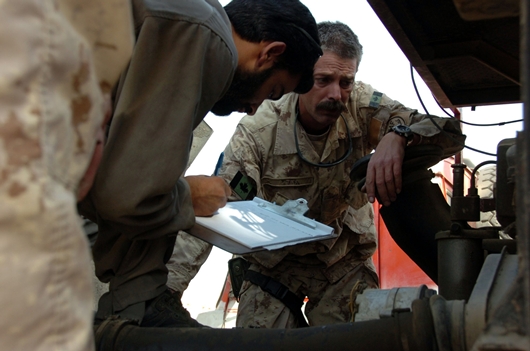
Members of the Kandahar Provincial Reconstruction Team conduct a site visit to the Afghan National Police Fire Brigade station in Kandahar City.
We are interested in connecting with all our stakeholders to learn about your knowledge and information needs as they pertain to PTSD and related mental health conditions.
Please complete the survey to tell us what information you want to know, how you want to learn about it, and how you would like to use it to inform your work and life. We will use your responses to help ensure our ongoing research and information-sharing work is aligned with, and responsive to, your needs and preferences.
Background
The Centre of Excellence (CoE) on PTSD wants to identify and prioritize research gaps and knowledge/information needs on the topic of PTSD and related mental health conditions that are specific to Veterans and their Families/supporters.
This information will help align the CoE’s ongoing research and knowledge mobilization work with stakeholder needs and preferences.
Purpose of Survey
This brief survey is focussed specifically on the knowledge/information needs of CoE stakeholders, including Veterans, their Families/supporters, researchers, and service providers.
You will be asked to share:
- Your knowledge/information needs about PTSD and related mental health conditions (for both Veterans and Veteran Families/supporters),
- Your preferred ways of having those needs met,
- The ways in which you use, or would like to use knowledge/information.
We understand that many of you bring many perspectives (e.g., service provider, person with lived/living experience of PTSD/related mental health conditions, Veteran, Family member, etc.). We encourage you to speak from any of these perspectives when answering the questions that follow. If any of the questions are not applicable to you, please leave them blank.
Thank you for your contribution, and for helping us in our work to improve services and supports for Veterans and their Families.